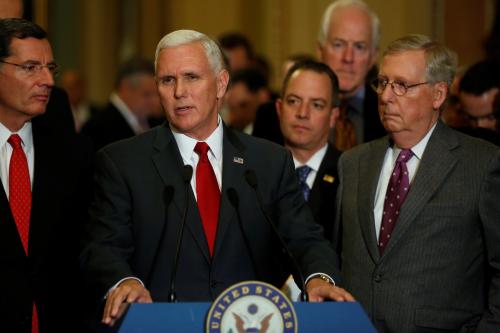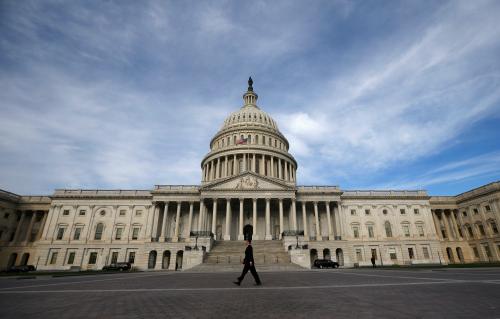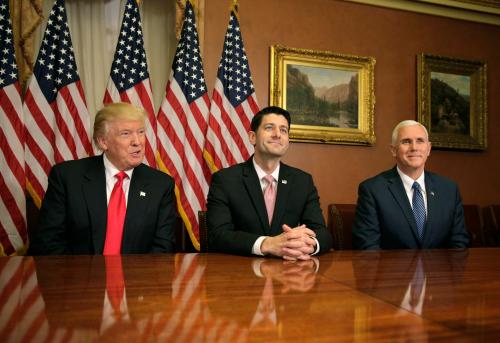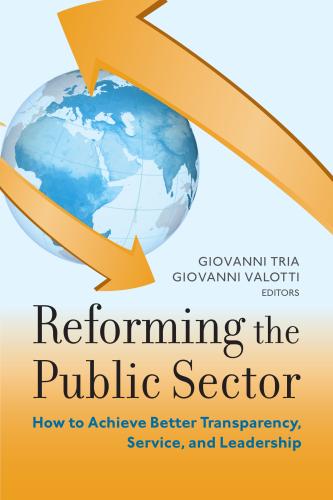Molly E. Reynolds, an expert in Congressional procedure, and Vanessa Williamson, an expert on tax attitudes, discuss what the failed attempt at the repeal of the Affordable Care Act reveals about the upcoming fight over tax reform.
VW: So, before we get started on the politics of the next fight, Molly, let’s quickly review the tax policies that were in the failed ACA repeal. Back in 2010, there were taxes that were created or increased to help pay for the Affordable Care Act. For instance, the ACA raised Medicare contributions for individuals earning over $200,000 a year. The Republican health care plan would have financed rolling back some of those taxes with cuts to Medicaid – and now, none of those tax cuts have happened.
Can you explain the implications this has for tax reform?
MR: The issue now is if Republicans still want to cut those particular taxes as part of a broader tax package, they have to find a way to pay for them within the bigger bill. While it seems like they may leave the ACA taxes alone, they still lose the political benefit of being able to say they made a down payment on tax reduction as they try to work out the details of a broader package.
VW: This is probably what Grover Norquist was talking about when he said that because ACA repeal failed, corporate taxes can only go down to 28%, instead of the 20% Paul Ryan has called for, and the 15% President Trump campaigned on. But let’s take a step back. Why do Republicans have to find a way to pay for revenue reductions in this tax bill, with or without the ACA taxes, in the first place?
MR: It’s both procedure and politics. Procedurally, if Republicans are going to use the budget reconciliation process—which protects the bill from a filibuster in the Senate—the Byrd Rule means that it can’t increase the deficit outside the ten-year window following passage of the bill. Politically, Republican leaders, at least in the House, have made it clear that their preference is for a tax reform package that doesn’t make the deficit worse. Exactly how that math works is a subject of some debate, though, and it remains to be seen whether they stick to this plan.
VW: Ok, so let’s talk about the likelihood of tax reform versus just tax cuts. Some Republican leaders have put forward competing plans that would entail fundamental changes to federal taxation.
MR : Yes, but they don’t all agree on what those should look like. We often think of Republicans as the pro-business party, but on things like the border adjustment tax, business interests aren’t all speaking with one voice. On one hand, industries that rely heavily on imports, like retailers and grocers, have come out against the bill on the grounds that it would raise prices for consumers. On the other hand, exporters and domestically-focused industries favor the measure.
And it’s not just the border adjustment tax that’s drawn criticism from the business community. For example, a coalition of real estate, telecommunications, and finance interests has emerged to try to save the corporate interest deduction. To build a coalition in favor of major tax reform, Republicans will have to thread several very tricky needles.
VW: And the political situation in Washington is very different from the last time tax reform actually occurred, as our colleague Bill Gale has pointed out.
One of the striking features of the health care debate this year was the strength of the opposition Paul Ryan had on his right. Is that likely to be a factor in the tax fight?
MR: That’s a great question, and the answer may depend somewhat on the substance of whatever congressional Republicans come up with. Former House Freedom Caucus (HFC) chair Jim Jordan (R-Ohio), for example, has criticized the idea of a border adjustment tax because “the idea that you’re going to add an entirely new tax is a big problem.” At the same time, the HFC may find the politics of opposing tax reform on principle more difficult than their obstruction on health care. So we’ll have to wait and see.
So far, we’ve just talked about how members of Congress might think about tax reform—but how should we expect their constituents to think about it?
VW: One major issue with the kind of tax reform Republicans have been proposing is that the average voter is unfamiliar with policies like the border adjustment tax. People do not like uncertainty—particularly if that uncertainty is about bread-and-butter issues like the possibility of prices rising at the local store.
MR: No wonder most people think the administration’s pledge to have this done by August is unrealistic.
VW: Right. But if they can’t get agreement on tax reform, they are still going to want to do something on taxes. What are the relevant rules if it’s just tax cuts?
MR: The same Byrd Rule provision applies to a straight tax cut bill: it can’t increase the deficit outside of a ten-year window. One way Republicans have addressed this in the past is by enacting tax cuts that sunset after ten years, like the estate tax cut in the 2001 tax bill.
VW: Let’s talk about that for a second, just because it was so odd. When Republicans wanted to repeal the estate tax, they couldn’t do so outright, because of this Byrd Rule you talked about. So the law was written so that the estate tax would go away and then come back. That meant that, if you had an estate worth many millions, and you died on December 31st, 2010, your heirs paid no estate tax. Die one day later, and suddenly there was a big tax on the part of the estate over about $5 million. A pretty awkward position for would-be wealthy heirs; Paul Krugman called it the “Throw Momma From the Train Act of 2001.”
Of course, on estate tax repeal, Democrats really struggled to explain the economic stakes to average people.
MR: Public attitudes towards taxes can be complicated, right? How should we expect voters to respond this year?
VW: One aspect of a tax cut bill that might change Democrats’ calculations is whether Republicans include any broad-based tax reduction, which might help obscure the benefits that go to the very wealthy. That was the strategy used for the Bush-era tax cuts, and several analyses have suggested that voters did not fully understand the implications of those bills. But a broad tax cut is harder to do now if Republicans also want to do the very top-heavy tax cuts that they did not get via ACA repeal. And, the political moment is very different now. For instance, George W. Bush was, at the time of both rounds of his tax cuts, vastly more popular than Donald Trump is.
How do you expect Democrats in Congress to respond if similar cuts are proposed this time? Are there Democrats willing to compromise here, unlike on ACA repeal?
MR: Our colleague Sarah Binder has written about this. One of the big takeaways from the experience of the health care bill is that—at least in the contemporary context—using reconciliation reduces the pressure on the minority party to cooperate at all, because the majority party has adopted a strategy that means they don’t need any votes from the other team to pass something, so long as the majority party is unified. In other words, Democrats can sit back and watch Republicans fight it out amongst themselves.
VW: In the court of public opinion, Democrats should probably keep it very simple. Emphasize the potential for a border-adjustment tax to raise costs at the grocery store. Oppose special tax breaks for companies hiding profits overseas—that’s a kind of tax avoidance that angers Democrats, Republicans, and independents.
Or simply say “no big top-heavy tax cuts without financial transparency in the White House” (or preferably a catchier slogan like “no tax cuts without tax returns”). This is the only time in the modern era we’ve seen major tax reform put forward by a president who hasn’t released his own income tax returns. And we know that some policies Trump supports, like the Alternative Minimum Tax (AMT) repeal, would have had huge benefits for him personally in the past. That’s a totally new factor in this year’s tax debates.
MR: So where does this leave us? A tax package is obviously an important play for Republicans, and for me, the biggest question is whether they’ll have to move the goal posts and settle for a tax cut rather than broader tax reform.
VW: I think it’ll end up being tax-cuts-for-millionaires. Real tax reform is like a legislative ballet and so far this Republican majority has two right feet.
The Brookings Institution is committed to quality, independence, and impact.
We are supported by a diverse array of funders. In line with our values and policies, each Brookings publication represents the sole views of its author(s).












Commentary
What does the ACA repeal fight tell us about the upcoming battle over tax reform?
April 5, 2017